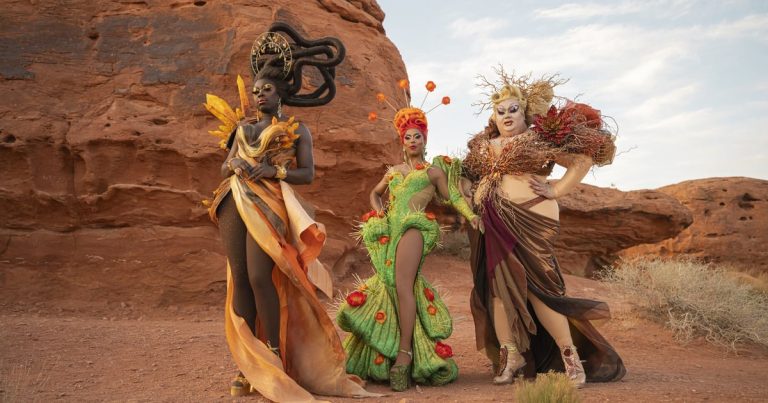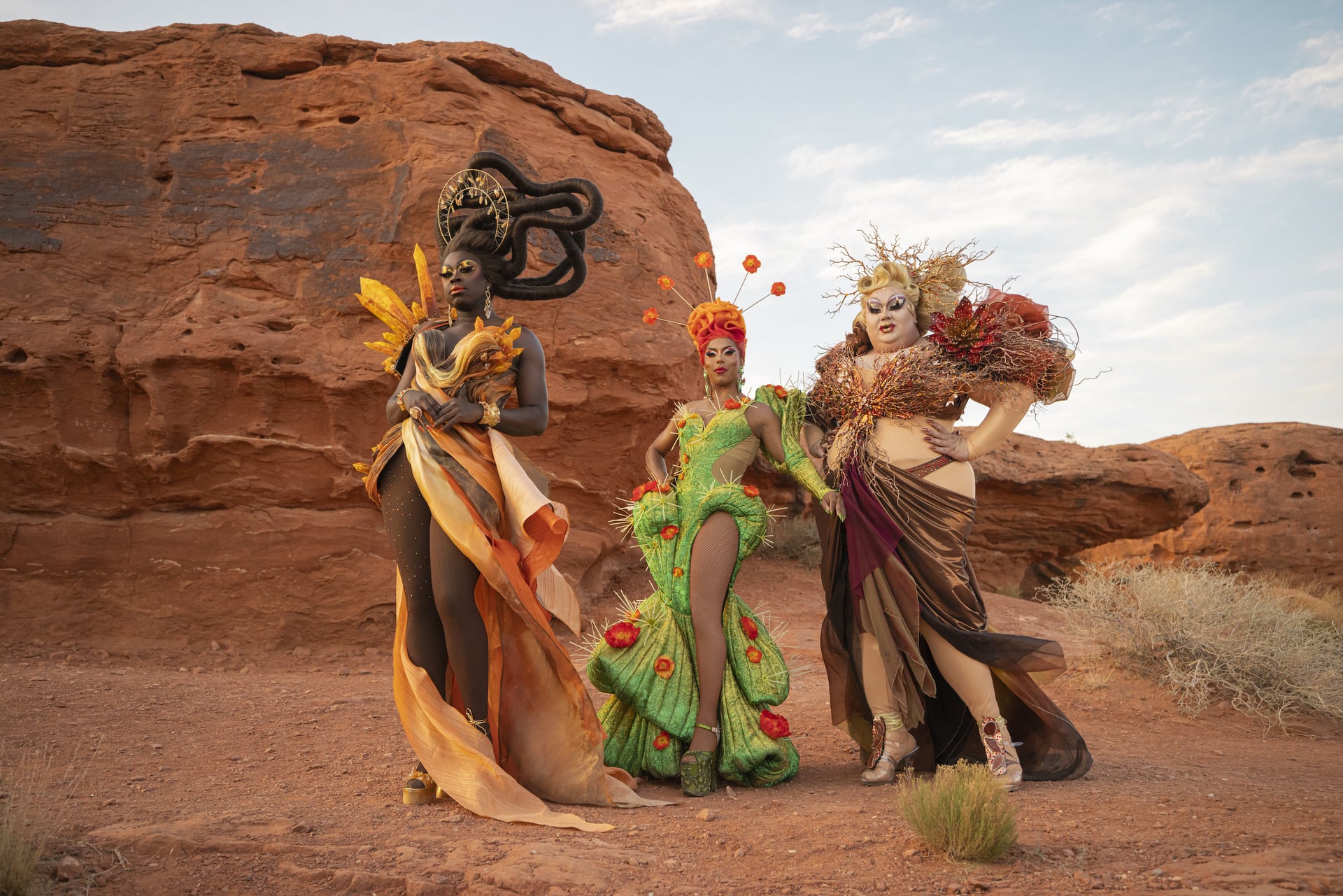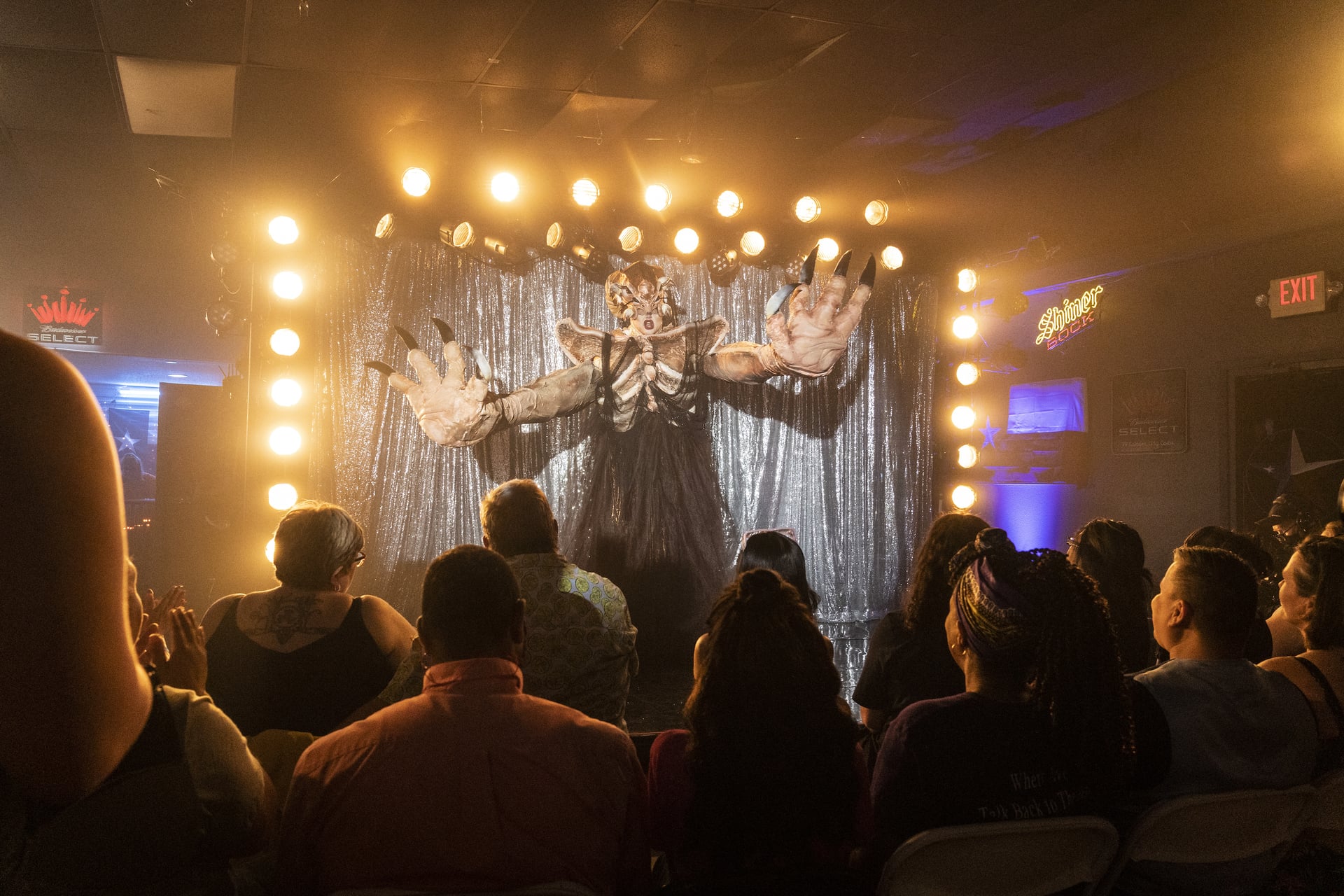

Picture Supply: HBO
It is raining in New York this November morning, one of many first actually chilly rains of the season. However Shangela’s suite at an upscale Manhattan lodge is heat and floral. Orchestral Taylor Swift performs within the background, and a candle burns on her espresso desk.
Shangela loves a scented candle. Lighting one is a part of her self-care routine after lengthy days filming “We’re Right here.” The unscripted collection follows “RuPaul’s Drag Race” alums Shangela, Eureka O’Hara, and Bob the Drag Queen (who received “Drag Race” season eight) as they journey to small cities throughout america to assist newly minted drag kids in placing on a celebratory revue.
Within the ultimate scene of every episode, the queens’ drag kids carry out. The queer and trans performers, lots of them individuals of shade, bathe within the cathartic roar of group assist many did not know they’d. The straight contributors additionally remodel in solidarity with their LGBTQ+ family members, the cis males’s shells of masculinity cracking like eggs, exposing their glistening femininity to the rainbow lights. Every episode has bathed me in tears, popping the grape pores and skin of that place inside me that holds the sugary ache of queerness and letting it drain.
This morning, I am interviewing the queens about season three, which drops on HBO on Nov. 25. They’re all in New York Metropolis on the similar lodge, getting prepped for an enormous day of press, their hair and make-up groups swirling round them of their respective rooms. Regardless of the gloomy climate and early wakeup name, Shangela’s heat fills her suite like a radiator.
“I feel it is crucial to placed on an armor of self-love and confidence to exit into the world,” she says. Immediately, her armor is purple satin: a gown with a brief, off-the-shoulder sleeve; a gathered slitted skirt; and a boned sweetheart bodice. Her jewellery provides gold accents. “I assumed I might go for one thing very Mariah Carey-inspired at the moment,” she quips.
https://www.youtube.com/watch?v=9ghvJYFxt-0
Cozy with the scent of Zen Backyard and Shangela’s visceral glamor, the room feels protected. Nowadays, the panorama for LGBTQ+ individuals is something however. In 2022, lawmakers throughout america launched 155 items of anti-trans laws alone. Fascist teams throughout the nation confirmed as much as threaten quite a few Delight and drag occasions — in no less than one occasion, onlookers reported, with the obvious complicity of police.
And what the queens and I do not know within the Manhattan lodge is that simply 4 days later, a person with a gun would enter a queer nightclub in Colorado Springs, CO, throughout a drag present. He would kill 5 individuals and injure no less than 18.
The queens encountered racism and heterosexism in most of the cities they visited in seasons one and two of “We’re Right here.” However in season three, the queer- and transphobia coils extra tightly with violence. Within the city of St. George, UT, a metropolis official resigned amid backlash for granting a allow for the “We’re Right here” drag present. In Granbury, TX, Shangela is compelled to relocate a Drag Queen Story Hour after the primary venue receives threats.
Comparable threats to Drag Queen Story Hours have repeatedly made headlines this yr. I ask Shangela in regards to the underlying — and false — accusation that queer and trans persons are extra prone to hurt kids. In any case, I say, “The youngsters are queer and trans!”
“Honey, they’re,” Shangela replies. “And it is essential for them to know that they don’t seem to be alone in their very own identification. They aren’t bizarre or completely different. They should not be ostracized or hidden.”
“My drag and my Blackness and my activism and my queerness have at all times been — they’re actually interwoven.”
As Shangela places the ending touches on her look, I navigate a labyrinth of hallways and elevators to Bob the Drag Queen’s room. Bob, too, affirms that what harms children is discrimination, not illustration. The slurs towards queer position fashions are “a tactic by conservatives, as a result of whenever you say you are simply defending children, you may justify something,” she says.
Bob floats into her suite’s sitting room carrying a golden trapeze gown, small pearls embellishing a internet overskirt. Her updo is a heavy beehive the colour of dripping honey. The gown was made by Godoy and impressed by Angeria on “RuPaul’s Drag Race.” “It’s extremely snug,” she says, excellent for an extended day of press. “After I’m uncomfortable, I grow to be a monster. I simply need to be as snug as potential, for the sake of these round me.”
“A monster, however like, in a scorching, queer approach,” I say.
“Precisely,” Bob agrees. “A Girl Gaga monster.”
Since no less than the 1700s, dominant European and white American tradition has accused people we might at the moment name queer and trans of monstrosity. This violent want to manage those that defy the gender binary, mixed with white supremacy, underlies the anti-trans laws and rhetoric we see at the moment.
In Granbury, the primary episode of season three, the queens reclaim this monstrosity by staging a freak-show-themed drag efficiency. Freak reveals have been traditionally a approach for white European and American society to dehumanize colonized and disabled individuals. Within the “We’re Right here” freak present, nevertheless, Eureka emerges on stage radiant in her fats queerness. She wears monumental prosthetics resembling an alien from a horror film, evoking the aesthetic lineage of tentacled drag queens.

Picture Supply: HBO / Greg Endries
Drag has at all times been political, a method for marginalized individuals — particularly Black trans femmes — to manage their very own narrative. When she was in her 20s in New York, Bob did activism in drag as a part of a collection of wedding-themed protest performances for marriage equality.
“My drag and my Blackness and my activism and my queerness have at all times been — they’re actually interwoven,” she tells me. “It is like threads in a sheet. You possibly can’t separate the net with out destroying the sheet.”
She attracts on the legacy of Black queer and trans resistance in her new single, “Black.” I ask her in regards to the music video’s protest imagery — Black queer people triumphing over hooded figures, Jan. 6 insurrectionists, and a police automobile — and the way she connects it to “We’re Right here.”
“A number of instances, queer individuals in areas really feel simply kinda unsafe round police officers. And I feel that is truthful,” Bob explains. “I imply, the entire queer liberation began with an rebellion towards the police.”
Shangela, Bob, and Eureka are threatened with the potential of police violence in season one, when a Branson, MO, resident calls the cops on them merely for current in public.
“We really ended up having an officer on our present,” Bob tells me. “I used to be like, ‘Whoa, if I will be with an officer, I will discuss these points.'”
That is information to me, however Eureka later confirms that the trio tackle a police officer as certainly one of their drag kids. The episode, which I have not seen, comes afterward in season three.
“It is a queer individual that selected this line of occupation,” Eureka says, explaining the present treats the police officer’s expertise of gender. “So greater than ever, after all we’ll present up and assist that particular person, no matter points with blue lives, or police points, or something to that nature.” Later in our dialog, Eureka poses: “What does a police officer appear like that represents us in that world? Do now we have allies within the police power?”
It is a query the trendy queer motion has lengthy requested — and which many people have answered with a convincing “no.” It is not simply that LGBTQ+ individuals haven’t got allies among the many police — for a lot of, there’s a basic incompatibility between the establishment of policing and the aim of queer liberation.
As Bob reminds us, Delight started as a collection of riots towards police at locations like Stonewall and Compton’s Cafeteria. These uprisings have been led by drag queens and Black trans girls and femmes, like Marsha P. Johnson.
The state violence that instigated these riots hasn’t gone away. Previously a number of years, police have arrested and brutalized protesters for LGBTQ+ and Black liberation at Prides and protests throughout the nation. Jail and policing programs topic queer and trans people to violence on daily basis — from the continuing threats to queer households in Texas and past to the traumatic impacts of incarceration on trans individuals.
Impressed by the work of Black abolitionist queer and feminist thinkers like Angela Davis and the Black-led 2020 uprisings towards racism, a number of occasions, similar to Abolitionist Delight, have created police-free areas for LGBTQ+ protest and celebration. Activist efforts have additionally led Prides in New York and San Francisco to both ban or restrict uniformed police.
After I went to interview the solid of “We’re Right here,” I assumed, naively, that I might be capable of write a easy, cute piece in regards to the significance of visibility. However queer tradition teaches us it is by no means that straightforward.
“If I am not in ache, I do not really feel like I am totally in drag,” Eureka says, referring to the squeeze of the corset she dons as she will get prepared. The corset is a metaphor for gender itself — the way in which it hurts even when it matches, even when it is lovely.
As I write this, most of the individuals who have been shot in Colorado Springs stay within the hospital. Communities proceed to mourn those that have been killed. It is a painful element that, on Saturday night time, the group had gathered to rejoice trans lives in honor of Transgender Day of Remembrance. Grief nests inside grief. What wouldn’t it take to make a world by which the family members we have misplaced nonetheless lived?
I consider how “We’re Right here” — in its centering of Black, Indigenous, and trans queer narratives — reminds us that popping out is for all of us however particularly for these most marginalized. Popping out — with the ability to transfer outdoors in freedom and having a protected place to return dwelling to — is for the particular person making an attempt a femme search for the primary time (Shangela recommends a dab of fragrance). For the infant queer trapped in a hostile household. For all our queer and trans siblings who’re incarcerated.
Sooner or later, I do know — as a result of our elders handed their hope to us — the ache of the corset will solely be the corset. Sooner or later, we are going to glue on our lashes and look as much as see a liberated world.